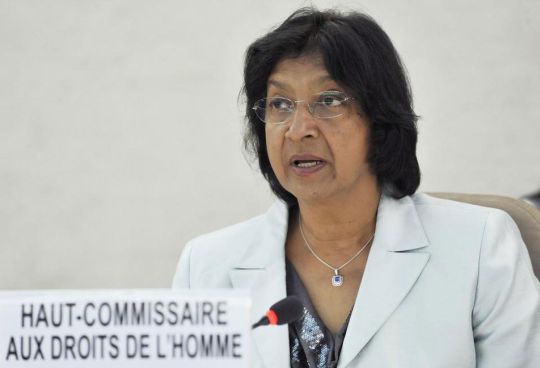UN human rights chief welcomes lifting of state of emergency in Fiji
UN human rights chief welcomes lifting of state of emergency in Fiji
 High Commissioner for Human Rights Navi Pillay
High Commissioner for Human Rights Navi Pillay
The United Nations human rights chief today welcomed the lifting of a state of emergency in Fiji, more than two years after it was imposed, calling it a “step in the right direction” for the Pacific island nation.
“The emergency law has seriously restricted the right to public assembly and freedom of expression, and given the authorities broad powers of arrest and detention,” said Navi Pillay, the UN High Commissioner for Human Rights, in a statement.
“I welcome the cancellation of the emergency law and encourage the Government to build on this positive momentum with concrete steps to ensure full respect for the rule of law and human rights.”
I welcome the cancellation of the emergency law and encourage the Government to build on this positive momentum with concrete steps to ensure full respect for the rule of law and human rights.
Fiji had committed to lifting the emergency regulations before the UN Human Rights Council during its Universal Periodic Review in 2009, a pledge the South Pacific island nation has now fulfilled, Ms. Pillay noted.
She also took note of Prime Minister Josaia V. Bainimarama’s announcement that amendments have been made to the Public Order Act, voicing hope that those amendments would be in line with international human rights norms and would not in any way replicate the restrictions in the public emergency regulations.
Ms. Pillay, however, expressed concern over recent developments in which critics of the Government have faced criminal charges, arbitrary detention and other forms of intimidation.
“Silencing criticism with such heavy-handed measures is in breach of international human rights standards. I urge the Government to ensure that the rule of law is fully respected and that there is space for civil society to operate without fear,” she said.
“As Fiji begins its constitution-making process and prepares for elections to be held in 2014, I look forward to seeing an environment in which ordinary people and civil society organizations can participate fully.”
She said the UN Office of the High Commissioner for Human Rights (OHCHR) regional bureau for the Pacific remains ready to support national efforts to further the promotion and protection of human rights in Fiji.
###
About Office of the United Nations High Commissioner for Human Rights (OHCHR)
Who we are
The Office of the United Nations High Commissioner for Human Rights (OHCHR) represents the world’s commitment to universal ideals of human dignity. We have a unique mandate from the international community to promote and protect all human rights.
Leadership
The High Commissioner for Human Rights is the principal human rights official of the United Nations. The High Commissioner heads OHCHR and spearheads the United Nations’ human rights efforts. We offer leadership, work objectively, educate and take action to empower individuals and assist States in upholding human rights. We are a part of the United Nations Secretariat with our headquarters in Geneva.
The Office’s priorities are set out in two key strategic documents: the OHCHR Plan of Action and its Strategic Management Plan 2010-2011. These priorities include greater country engagement, working closely with our partners at the country and local levels, in order to ensure that international human rights standards are implemented on the ground; a stronger leadership role for the High Commissioner; and closer partnerships with civil society and United Nations agencies.
United Nations human rights system
We also support the work of the United Nations human rights mechanisms, such as the Human Rights Council and the core treaty bodies set up for monitoring State Parties’ compliance with international human rights treaties, promote the right to development, coordinate United Nations human rights education and public information activities, and strengthens human rights across the United Nations system. We work to ensure the enforcement of universally recognized human rights norms, including through promoting both the universal ratification and implementation of the major human rights treaties and respect for the rule of law.
Our structure
We have an office at United Nations headquarters in New York and offices in numerous countries and regions. In addition to the Executive Office of the High Commissioner and a number of units that report to the Deputy High Commissioner, OHCHR has two major divisions and four branches.
To implement our comprehensive mandate, we employ more than 850 staff (last update in April 2007), based in Geneva and New York and in 11 country offices and seven regional offices around the world, including a workforce of some 240 international human rights officers serving in UN peace missions. We are funded from the United Nations regular budget and from voluntary contributions from Member States, intergovernmental organizations, foundations and individuals.

###
> United Nations (UN).
 The United Nations was established on 24 October 1945 by 51 countries committed to preserving peace through international cooperation and collective security. Today, nearly every nation in the world belongs to the UN: membership totals 192 countries.
The United Nations was established on 24 October 1945 by 51 countries committed to preserving peace through international cooperation and collective security. Today, nearly every nation in the world belongs to the UN: membership totals 192 countries.
When States become Members of the United Nations, they agree to accept the obligations of the UN Charter, an international treaty that sets out basic principles of international relations. According to the Charter, the UN has four purposes:
- to maintain international peace and security;
- to develop friendly relations among nations;
- to cooperate in solving international problems and in promoting respect for human rights;
- and to be a centre for harmonizing the actions of nations.
###
* The above story is adapted from materials provided by United Nations (UN)
** More information at United Nations (UN)


















